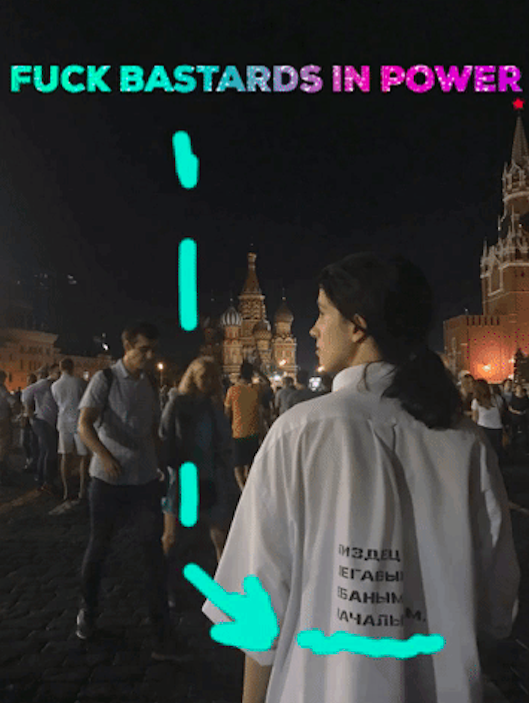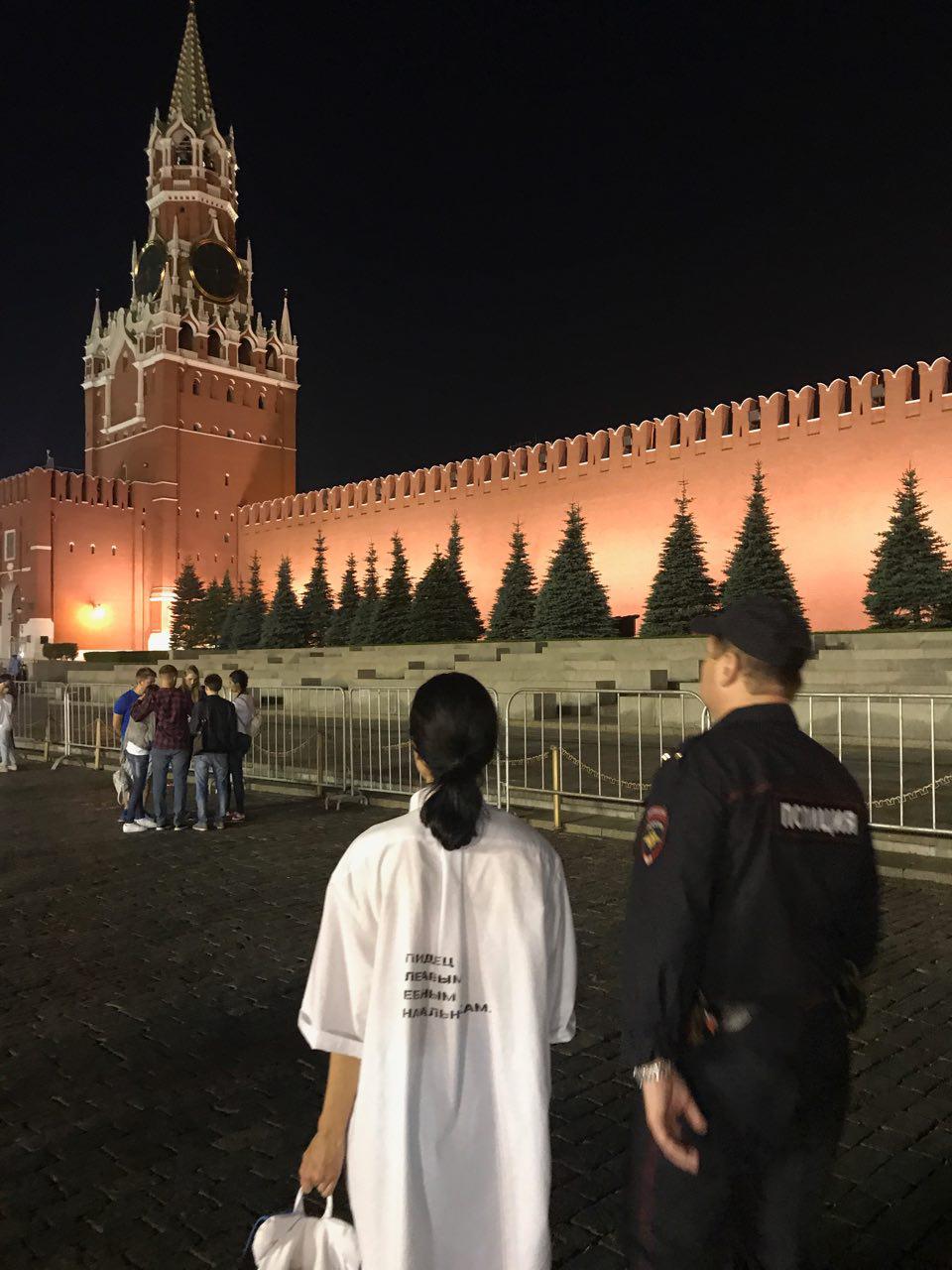As part of her new i-D column on activism, Russian punk activist Nadya Tolokonnikova reports on the positive effects hosting the World Cup has had on the people of Moscow, and the dark truths they’re masking.
This week, Russians from all over the country are writing blog posts about their surprisingly warm interactions with foreigners. “How did I host those British hooligans?” one article begins, before the woman comes to the conclusion that, actually, those hooligans aren’t hooligans but are actually some of the nicest people she’s ever met. There have been tons of welcoming and celebratory articles, all written by regular Russian people — not by us pro-west activists, so-called “enemies of Russia” — despite all of the anti-West propaganda that has been overwhelming Russian TV channels for years. All backed by corrupt elites whose kids are quietly living and studying in prestigious schools in Europe and America. This hate for the west doesn’t seem to resonate with ordinary Russians today — certainly not as much as our government would like it to.
This doesn’t mean that the camp of anti-western bloggers and journalists have completely disappeared, but during the World Cup their influence has shrunk. They’re not at the top of the news agenda anymore, and they’re not very well represented in mainstream Kremlin-owned or controlled media. In other words, they’re not being legitimised by the state apparatus.
There was a column published a week ago by national tabloid Moskovsky Komsomolets that announced; “Russian women are disgracing themselves and their country during the World Cup.” In it, writer Platon Besedin wrote that “social networks are overloaded with videos where young and not so young Russian women are behaving like overused prostitutes with low social responsibility”. This is typical slut-shaming and nothing new, but what is significant in this case is that Platon was not met with support. On the contrary, over 25,000 Russian women signed a petition demanding that the journalist apologize, and requesting that the government implement a criminal article on him for “extremism” according to article 282 of the Criminal Code. The columnist apologized and Russian women publicly proclaimed: we sleep with who we want. Our body, our choice.
To highlight the troubles faced by migrants in Moscow, a football match between refugeestook place in Red Square a couple of days ago. “It’s possible, but only during the championship,” said journalist and Pussy Riot’s good friend Alexander Chernykh, of this alternative World Cup fixture. Refugees from Syria, Afghanistan, Cameroon, the Ivory Coast and Zimbabwe played football with LGBTQ activists in front of St. Basil’s Cathedral — a spot where you’d usually be arrested within ten seconds for any kind of action supporting these issues.
I’m not into football. But I love it when people celebrate; when they’re genuinely happy, when they feel united for a good cause. Like any good activist, I love to dream about alternative futures. And after Russia beat Spain on 1 July, it certainly seemed like one. There were many people outside, laughing, blocking squares and streets, chanting, screaming, hugging. The police were behaving themselves — being polite and friendly. While Russia has other large public events, most of them are somehow infected by the government’s propaganda machine, like the patriotic Victory Day or Day of Russia.

The police officers I saw last week reminded me of Uncle Styopa, The Militiaman, a kind and cozy Soviet propaganda cartoon from the mid-60s, about a good cop who humbly helps everybody he sees. I went into the subway on the day Russia beat Spain, and the police and normally grumpy subway workers were chanting, “Entrance is free! Free entrance!” The doors were open for everybody. People were drinking beer in front of policemen, and rather than arresting them, the police were cheerfully explaining to people who to get to their destination. Sure, it was likely the result of an order from those above, but just imagine for a minute what it would be like if this human-oriented policy stayed with Russian police forever?
I saw workers from central Asia — some of them illegal, and who, in our usual non-celebratory world, would often be scapegoated by nationalists for “stealing our jobs” — cheering in their orange uniforms with Russian flags painted on their faces, hugging normally uptight Muscovites. People seem to be getting into the habit of hanging out in the streets together. This isn’t normal for Moscow. Even we feel we need to take to the streets to be seen and make our opinions clear, it’s not easy for us to leave our homes. I’m not saying that these Russians celebrating the World Cup are anti-Kremlin, they’re not. But this habit will live on somewhere in our subconscious.
That’s the good news. Here’s the bad: Putin’s policies have not changed at all. As in the case of 2014’s Sochi Winter Olympics, a group celebration is not an option for those who choose to protest. And while this is all an honest celebration for many Russians (and it warms my heart), for our government it’s just another chance to build a nice facade to hide the cruel reality; mass arrests for supporting Kremlin critic Navalny, and new politically-charged criminal cases for taking part in anti-Putin rallies as exemplified in Chelyabinsk. Elsewhere, political prisoner Oleg Sentsov — arrested in Crimea in 2014 as a pro-Ukrainian activist — has been on hunger strike for 54 days now and is slowly dying in Yamal penal colony. He demands the release of all Ukrainian citizens who’re being held in Russia as political prisoners. In other news, two-fifths of Russians may not live to see their retirement: the Russian state pension age could be hiked from 60 to 65 for men and 55 to 63 for women. Mass protests against this measure are being buried under the news of World Cup game. ‘Preventive’ brutal and invasive police searches and arrests are another instrument of burying dissent, and the police are literally breaking down the doors of activists’ headquarters.
Diversity, openness, and inclusivity has seeped into Russian mainstream discourse because of the World Cup. We witnessed that a human-oriented law enforcement system is at least possible. Russian women proclaimed that it’s not anybody’s fucking business whether they choose to be sluts or not. I wish these attitudes would not just stick around, but grow into a reality where you don’t have to be abused for having an opinion that’s not in line with the official one. Maybe I’m just another dreamer. But I have to hope.
